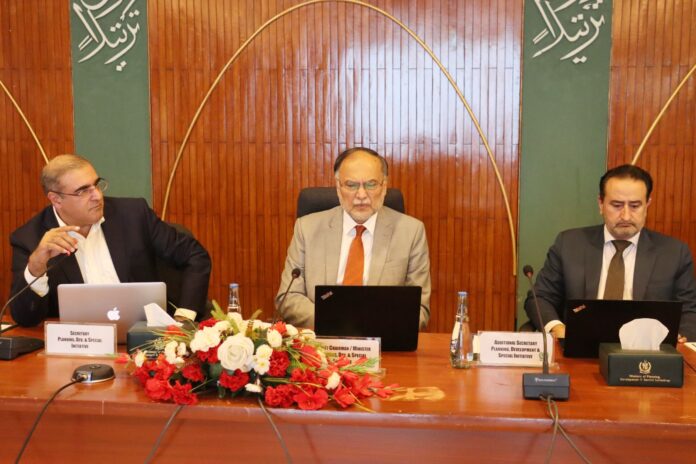The Central Development Working Party (CDWP) approved eight major development projects worth Rs 25.191 billion on Saturday, with an additional project of Rs 10.671 billion recommended to the Executive Committee of the National Economic Council (ECNEC) for final approval.
The meeting, chaired by Minister for Planning, Development & Special Initiatives Professor Ahsan Iqbal, saw the approval of key projects across various sectors, including energy, education, transportation, and technology. The session was attended by senior officials, including Awais Manzur Sumra, Secretary Planning, and representatives from provincial planning boards and federal ministries.
One of the major projects approved was in the food and agriculture sector, with Rs 990 million allocated to establish the “Speed Breeding Platform for Development of Climate-Smart Hybrid Crops.” The project aims to enhance the development of weather-resistant crops using hybrid technology.
In the higher education sector, the committee approved the “Dr. A.Q. Khan Institute of Materials & Emerging Sciences” with an investment of Rs 3.538 billion. The institute will be established at Quaid-e-Azam University and will focus on materials science and emerging technologies. Technical assistance for the project will be provided by the University of Cambridge.
For the information technology sector, the “Digitalization of In-House Processes & Automation of Examination System of Federal Public Service Commission (FPSC)” project was approved with an allocation of Rs 3.048 billion. The project is designed to modernize FPSC’s recruitment process, aligning with the government’s broader e-governance vision under the Digital Pakistan initiative.
The committee also approved Rs 3.385 billion for the “NILOP – PIEAS Emerging Technologies Center,” aiming to enhance Pakistan’s technological capabilities to address challenges related to the digital and industrial revolutions.
A key project in the energy sector, the “16 MW Hydropower Project Nalter-III” in Gilgit-Baltistan, was recommended to ECNEC for approval. This project, worth Rs 10.671 billion, aims to improve energy access in the region. The project includes a canal construction, sedimentation basin, and a 10 km transmission line to provide much-needed power to the area.
In transportation, four projects were approved, including road expansions in Chitral, Loralai, and Punjab, and a feasibility study for trans-Afghan rail connectivity under the URAAN Pakistan initiative.
The committee also reviewed the “Action to Strengthen Performance for Inclusive and Responsive Education” project funded by the World Bank, which aims to transform Islamabad’s education system into a model for other provinces. Deputy Chairman of the Planning Commission, Ahsan Iqbal, emphasized the importance of education reform as part of broader development goals.




